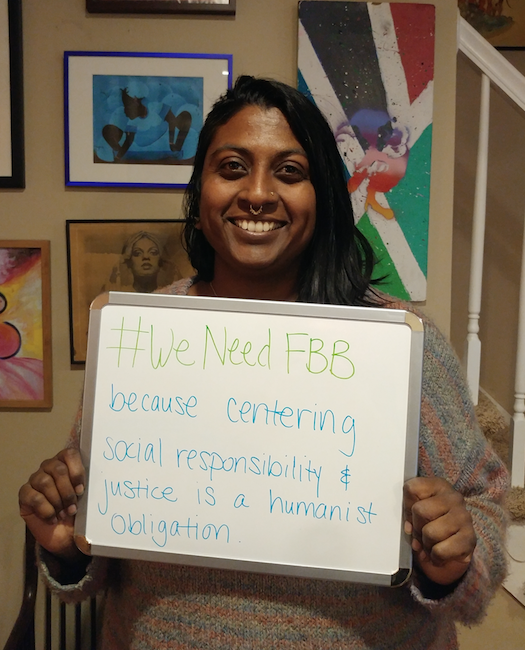Social Responsibility & Justice: Why I Serve on FBB’s Board
By AdministratorIn March 2016, I joined FBB’s board of directors. Earlier that year, I had met executive director Noelle George at the Secular Social Justice Conference (SSJCon) in Houston. At the time, I was a newbie to the secular community. My professional work and passion was—and continues to be—focused on nonprofit and grassroots social justice movement-building. SSJCon appealed to this passion and offered invigorating spaces that centered peoples of color, making me feel respected as an Asian Indian-American atheist. The conference inspired me to dedicate some energy to the secular movement. FBB offered me a forum to do so.
At SSJCon, I began to truly understand that humanism is about deeply valuing and working to improve the human condition. Conference panelists spoke of how this requires embodying a sense of social responsibility that acknowledges and works to dismantle historical oppression. A major reason why I identify as humanist is because I refuse to take part in religious institutions that have systematically oppressed my people in the name of “serving” and “saving” us. Throughout history, service programs have been framed as “God’s work” while simultaneously destroying cultures, communities, and individual autonomy. As an atheist who has dedicated her life to service and justice without religious motivation, I often felt alone. That is, until I learned about FBB.
“The care and thoughtfulness which the Humanist Action: Ghana brings to this process… increases non-religious engagement in service.”
This is why I support FBB. The Humanist Action: Ghana (HA: Ghana), an international service program aiding local organizations in Ghana since 2015, demonstrates that secular individuals also value service to our fellow humans and can do so without disrespectfully pushing a worldview – secular or otherwise. HA: Ghana gives me hope that we can shift the narrative about the secular community as well as our responsibility to each other as human beings.
With this said, as I discussed on the Armchair Atheism podcast with Taylor Carr, as secular people we need to be very intentional about not repeating oppressive patterns. “Service” has been wielded to uphold religious dominance as well as white supremacy, patriarchy, and other forms of oppression. Secular people are also very capable of upholding these systems of oppression. When considering FBB board membership, I knew if I were to dedicate my valuable time and energy to the secular movement, I needed a role in which my contributions, and those of our society’s most marginalized communities, would be respected without tokenization or marginalization.
I feel I have found such a place in FBB. The Humanist Grants Program, which pools monthly donations from humanists to give grants to carefully selected charities, provides ample example, as demonstrated by one of its several Defining Values:
“Community Based: solutions are being addressed with strong community input; onsite employees are local wherever possible.”
FBB has designed a grants program that centers the expertise of those most negatively impacted by social injustice. It is rare to find philanthropic organizations that recognize this necessary truth. My experience in philanthropy, public policy, and organizing has taught me that dismantling an unjust system requires investment in local leadership with lived experience in the issues. My experience as a child of immigrants from India, a country that has received more than its fair share of disrespectful volunteers and “charity,” has taught me that any charitable service must actively denounce white saviorism (both religious and secular). Service, including monetary support like grants, must be rooted in the humanist value of unbiased respect for the sustainable well-being of those receiving support.

Two years ago, I was in search of people with a similar innate sense of social responsibility to our fellow human beings without reliance on the concept of a higher power. People who know that if we learn from humanity’s faults and oppressive history, and invest in our most marginalized communities, we can create an equitable and just society. Secular organizations should look to FBB’s model as a framework for creating a space that is worthwhile for marginalized voices to dedicate time, energy, and capacity. For over two years, I have seen that FBB centers the values of social responsibility and justice, and that is why #WeNeedFBB.
